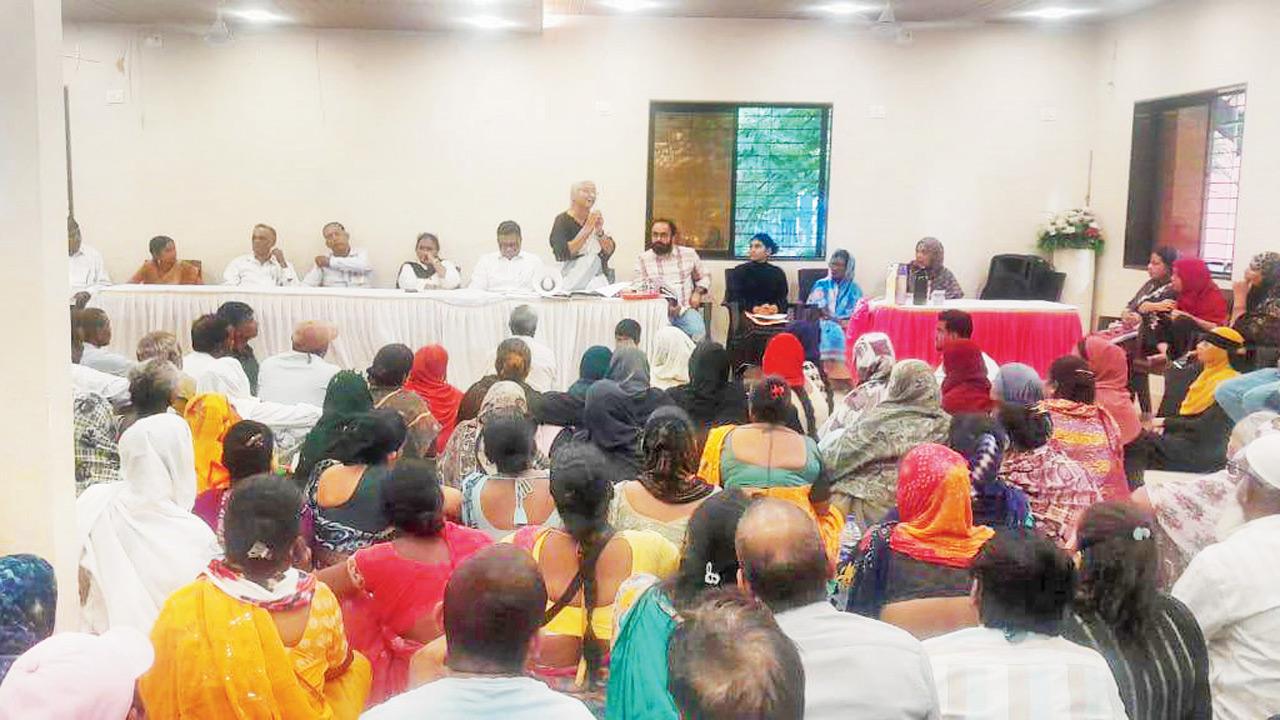In a landmark move for housing justice and community empowerment, Mumbai has begun talks for its first Self-Redevelopment Project under the Slum Rehabilitation Authority (SRA). The initiative, led by renowned social activist Medha Patkar and supported by the Maharashtra State Cooperative Housing and Apartment Federation, aims to usher in a new era of people-powered urban development.
Vsion by people, for people
This project isn’t just about bricks and mortar — it’s about rebuilding lives and communities. Over 250 families, evicted from Janta Nagar, Mandala, Mankhurd during a massive demolition drive in 2006, are now reclaiming their homes through collective action. In a historic shift, slum dwellers are no longer waiting for government schemes or private developers to rebuild for them — they are choosing to be their own developers.
Advocate Shreeprasad Parab addressing the gathering on Monday
“With a foundation rooted in self-help, mutual cooperation, and democratic control, these residents have opted for a cooperative redevelopment model, completely cutting out private builders once the project is approved by SRA and the state government,” said Advocate Shreeprasad Parab, expert director of the Maharashtra State Housing Federation, who addressed a public meeting at Chembur on October 6. “This reflects the true spirit of the cooperative movement — empowering people to take control of their own futures,” he added.
Milestone for Maharashtra
Traditionally, SRA projects have relied on private developers who construct free homes for slum dwellers in exchange for development rights. This new model flips that equation — for the first time, the residents themselves will act as developers.
Slum dwellers attend the community meeting
The community will decide on the design, quality, and timeline of their new homes — ensuring dignity, transparency, and ownership. Many families, despite years of displacement, have pledged to contribute financially to the initial SRA requirements once approvals come through. “This willingness to contribute speaks volumes about their unity and faith in each other, in the cooperative system, and in their shared vision,” Parab said.
Affordable housing, not free
Medha Patkar, who has been advocating for people-led housing models for years, said, “Self-redevelopment is the best solution, the cooperative movement is the path to make it happen. This model allows the poor to own their dream homes at an affordable cost, though not for free. We’ve had positive discussions with SRA officials and Pravin Darekar, who heads the State Housing Federation.”
State and federation’s role
The state government, under Pravin Darekar’s leadership, recently established a dedicated authority to promote self-redevelopment across Maharashtra. The Maharashtra State Cooperative Housing and Apartment Federation has taken on an advisory and facilitative role, helping communities navigate the legal, technical, and financial complexities, from registration to construction and final allotment. “This is more than redevelopment,” Parab said. “It’s a revival of the cooperative movement’s values — self-help, self-reliance, and social justice. If successful, this model can be replicated across thousands of slum clusters in Maharashtra.”
Flashback
Activist Poonam Kanougiya, associated with the Ghar Bachao Ghar Banao Andolan (Save Homes, Build Homes Movement), recalled, “We gathered around 200 residents from Mandala and nearby areas — most of them evicted in the 2006 demolition that affected nearly 5000 homes. Many lost documents in the 26/7 floods. The MMRDA fenced off 1.5 acres of land, and families have been fighting for rehabilitation ever since. Now, the formal proposal for redevelopment is ready and will soon be submitted to the authorities.”
Must back self-redevelopment
Advocate Parab outlined several key steps to make self-redevelopment viable and scalable: Single-window clearance: If passports take seven days and GST registrations two hours, cooperative housing approvals shouldn’t take months.
Special incentives: People-driven projects deserve extra FSI and fiscal benefits over profit-driven builder models.
Clear legal templates: One of the main reasons redevelopment projects face delays and disputes is the lack of clarity in agreements. Standardised agreements and MoUs to prevent disputes and delays.
Time-bound dispute resolution: All redevelopment conflicts must be resolved within three months. Digital transparency: Online monitoring systems to ensure accountability at every stage. Green redevelopment: Encourage sustainable, eco-friendly building practices.
Homes of hope
For the families of Janta Nagar, this project represents more than just housing; it’s about dignity, ownership, and the right to shape their own destiny. “The slum dwellers of Mumbai have proven that with courage, cooperation, and collective spirit, they can lay the foundation for their own homes, without a builder’s cheque,” Parab said. “It’s time for the state to make self-redevelopment the new norm, not just for the middle class, but for every family dreaming of a dignified home.”







